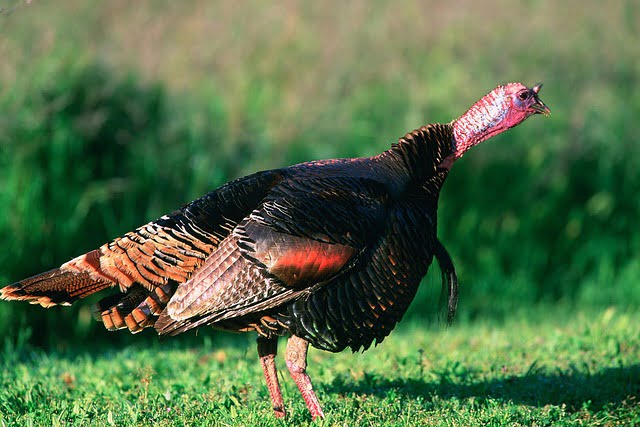Wild turkeys will consume ticks when they find them, but they are not active hunters of these ectoparasites. In the wild, when there are better food resources available, like the better tasting acorns, nuts, hickory, grains, tubers and tender greens, wild turkeys would doubtlessly choose them over ticks.
Poults (or baby turkeys) in particular are the real destructors of ticks. They can consume nearly 200 ticks per day when opportunity presents itself, according to the Pennsylvania Game Commission; a 100 years old state agency responsible for wild life conservation and management in Pennsylvania, United States.
If you are looking for critters and backyard friendly animals to get rid of ticks and all the pathogens they host alongside diseases they cause, you should consider investing in a guinea fowl, duck or even chicken patrol.
They seem to enjoy the pear-shaped bodies of ticks more than anything else. They pick up and eat ticks on plant leaves and on the ground surface. They can also help you get rid of snakes and weed seeds on your field or woodlot. The only downside to their introduction, is the fact that they will also consume beneficial insects when they see them, but such price should be easily worth paying to eliminate ticks from your land!
With these reliable patrol, your chances of getting bitten or infected from a visit to the crop filed is greatly diminished compared to when you invest time and money in attracting wild turkeys to your crop field and hoping they do the miraculous job of finishing all the ticks there.
What eats ticks?
Ticks are disease causing parasites with tiny hard heads and oval shaped bodies. They suck animal blood for sustenance and nothing after that, which is why every single potential host on the surface of the earth hates to catch a sight of them.
Ticks can be found in almost very corner around the world but mostly in warm and humid climates where they can find warm and cozy blood to fill up the perimeters of their bodies. While doing this, infected individuals can transfer diseases to the host which could be mammals, birds, reptiles and even amphibians.
With regards to their natural predators, tick have a lot of them. Many natural predators exist out there that love to consume the hard shells of hard ticks and soft bodies of soft ticks. Here are some of these predators and how they get rid of ticks.
The predators of ticks
Opossums
Opossums are experts at fishing out and killing ticks. Similar to a lot of small mammals that roam around in search of for tasty insects to eat, opossums are one of many hosts animals for ticks, but their difference with most of these animals is their ability to get rid of 90 percent of the tick population thriving on their bodies by consistent grooming. They can also consume up to 95 percent the populations of ticks that cross their path in the wild.
Opossums can eat as much as 5000 ticks per season (summer).
Guinea fowl
Guinea fowls will get rid of any insect tiny enough to fit inside their beaks; both the beneficial and non-beneficial ones like ticks. The best part? they wont peck on garden greens like chickens normally would after patrolling for ticks. Guinea fowls are native to Africa and they are an excellent patrols to have in large properties zoned for poultry.
Chickens
Chickens will eat any insects that comes their way. They are the second more realistic patrollers than after guinea fowl, but the cost of caring for them and sometimes the nuisance they cause is something to consider when investing on them as tick eradicators.
What do wild turkeys eat?
Wild turkeys are omnivores, opportunistic omnivores that love to enjoy acrons, nuts, hard masts, seeds, berries, ticks, grasses, small snakes, frogs, toads, salamanders and lizards.
They feed on cow pastures, backyard bird feeders, and even in small trees and shrubs.
Younger turkeys often feed subsist on a higher percentage of insect preys than their larger counterparts, simply because of the body building proteins it supplies to them which is crucial for their overall growth and development. Mother turkeys often carry their chicks to fields, woodlots or areas with the most abundant insect lifeforms to feed from.
Turkeys feed on ground, but can also fly into trees or onto dense shrubs to consume their hard masts.
Read here: Wild Turkey Diet: What do wild turkeys eat?
What eats wild turkeys?
Many predators like coyotes, gray wolves, bobcats, cougars, black bears, hawks, golden eagles, domestic cats, domestic dogs, red foxes and alligators prey on adult and juvenile turkeys.
Poults and nestlings are especially vulnerable to predation. Smaller mammals like raccoons opossums and skunks love to prey on them.
Eggs are mainly consumed by small mammals like the ones mentioned above and also by snakes such as rat snakes, gopher snakes and pine snakes.
More interesting article
Cite this Article ” (APA Format)
Bunu. M. (2020, July 28). Do wild turkeys eat ticks. Retrieved from http://emborawild.com/do-wild-turkeys-eat-ticks/

